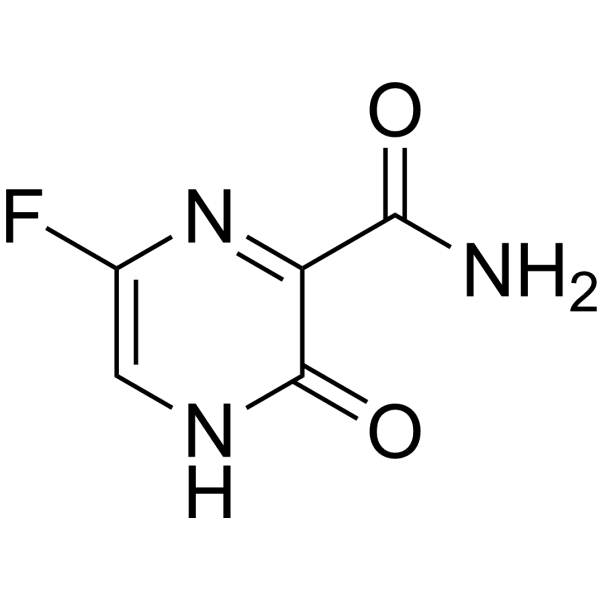All AbMole products are for research use only, cannot be used for human consumption.

Favipiravir (T-705) is a potent and selective RNA-dependent RNA polymerase inhibitor, used to treat influenza virus infections. Its active form, Favipiravir-ribofuranosyl-5′-triphosphate (RTP) inhibits the influenza viral RNA-dependent RNA polymerase (RdRP) activity with an IC50 of 341 nM. Favipiravir shows anti-influenza virus activities with IC50 ranged from 0.013 to 0.48 μg/ml for the influenza A viruses, from 0.039 to 0.089 μg/ml for the influenza B viruses, and from 0.030 to 0.057 μg/ml for the influenza C viruses. In mammalian cell lines (MDCK cells, Vero cells, HEL cells, A549 cells, HeLa cells, and HEp-2 cells), Favipiravir shows no cytotoxicity at concentrations up to 1,000 μg/ml. In MDCK cells inoculated with seasonal influenza A (H1N1) viruses, Favipiravir induces lethal mutagenesis.
| Cell Experiment | |
|---|---|
| Cell lines | MDCK cells, Vero cells, HEL cells, A549 cells, HeLa cells, and HEp-2 cells |
| Preparation method | The cytotoxicity of T-705 is evaluated by an assay with XTT. XTT is converted to aqueous formazan by an enzyme in MDCK cells, Vero cells, HEL cells, A549 cells, HeLa cells, and HEp-2 cells. The compounds are diluted to the appropriate concentrations (volume, 100 μl) with test medium (EMEM containing 10% FCS) in 96-well culture plates in which each well contains a concentration of 2 × 103 cells/100 μL. The test plates are incubated for 3 days at 37°C in 100% humidity and 5% CO2. After 3 days, 50 μl of the XTT reagent (1 mg/ml in FCS-free EMEM containing 5 mM phenazine methosulfate) is added, and the reaction product is assayed by measurement of the absorbance at 450 nm with a microplate reader. Cytotoxicity is expressed as the 50% cell-inhibitory concentration (CC50). |
| Concentrations | 1000 μg/mL |
| Incubation time | 3 d |
| Animal Experiment | |
|---|---|
| Animal models | Mice infected with influenza virus A/PR/8/34 |
| Formulation | 0.5% methylcellulose |
| Dosages | 200 mg/kg/day |
| Administration | p.o. |
| Molecular Weight | 157.1 |
| Formula | C5H4FN3O2 |
| CAS Number | 259793-96-9 |
| Solubility (25°C) | DMSO 50 mg/mL Water 5 mg/mL |
| Storage |
Powder -20°C 3 years ; 4°C 2 years In solvent -80°C 6 months ; -20°C 1 month |
| Related DNA/RNA Synthesis Products |
|---|
| Deoxyribonucleic Acid (from Salmon sperm)
Deoxyribonucleic Acid (from Salmon sperm) can be used as a research reagent, widely used in molecular biology, pharmacology and other scientific research. |
| GSK4418959
GSK4418959 (IDE275) is a non-covalent, reversible, selective and orally active WRN helicase inhibitor. GSK4418959 inhibits ATPase and DNA unwinding functions in an ATP-competitive manner. |
| Dencatistat
Dencatistat (P115) is an inhibitor of Cytidine Triphosphate Synthase 1 (CTPS1) with an IC50 value of ≤ 0.1 μM. |
| Antipain dihydrochloride
Antipain dihydrochloride is a protease inhibitor. Antipain dihydrochloride inhibits N-methyl-N'-nitro-N-nitrosoguanidine (MNNG)-induced transformation and increases chromosomal aberrations. Antipain dihydrochloride also restricts uterine DNA synthesis and function in mice. |
| Tetrahydrouridine
Tetrahydrouridine (THU) is potent inhibitor of cytidine deaminase (CDA), which competitively blocks the enzyme's active site more effectively than intrinsic cytidine. |
All AbMole products are for research use only, cannot be used for human consumption or veterinary use. We do not provide products or services to individuals. Please comply with the intended use and do not use AbMole products for any other purpose.


Products are for research use only. Not for human use. We do not sell to patients.
© Copyright 2010-2024 AbMole BioScience. All Rights Reserved.
